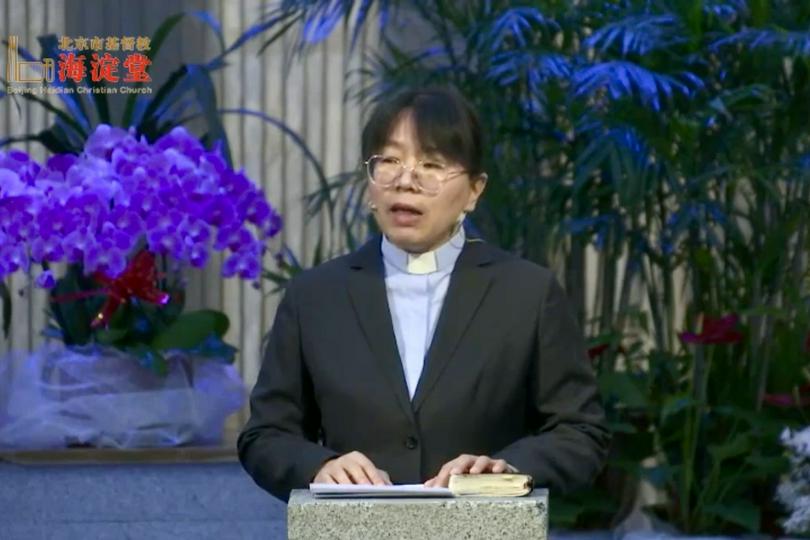Last Sunday, Rev. He Yonghua delivered a sermon titled "God's Calling" at Beijing Haidian Church, citing Romans 1:1–7 and offering an analysis of Apostle Paul’s self-introduction in his letter to the congregation in Rome.
Rev. He began by highlighting the impact of the Book of Romans on subsequent Christians, referencing renowned theologian Augustine and the Reformation leader Martin Luther. She explained that in Romans, Paul not only reveals how God justifies sinners through the gospel but also illustrates how God’s grace transforms the lives of Christians.
The pastor introduced the background that Paul wrote this letter to the Christians in Rome around A.D. 56. Since Paul did not establish this church and was unknown to its members, they may have questioned his authority and apostleship. Therefore, Paul began by introducing himself and outlining his upcoming ministry plans.
"The church faced the challenge of mutual acceptance due to its diverse composition," she remarked, noting that while most members were Gentiles, there were also Jews. To address this, Paul introduced the doctrine of justification by faith in Romans to encourage both Jewish and Gentile believers in Rome to accept, tolerate, and respect one another.
She then explained that the quoted verses serve as a general greeting, beginning with Paul’s self-introduction. Paul describes himself as a servant of Christ Jesus, reflecting his self-perception. "He belongs entirely to God, and all sovereignty is surrendered to Him," Rev. He added.
When introducing himself, Paul identified as both a servant and an apostle—two contrasting roles. "Paul highlighted his humility by acknowledging that he had no rights of his own and belonged entirely to the Lord. Yet he also affirmed his authority, as he was chosen, called, and set apart by God for the gospel," she explained. Although Paul had never met the Roman congregation, his apostolic calling gave him the legitimacy to exhort them, while his servant identity kept him grounded.
Delving into Paul’s mission statement—"set apart for the gospel of God"—Rev. He explained that the term "set apart" in the New International Version (NIV) Bible signifies being chosen for a distinct purpose. Paul embraced this calling with joy, not obligation. She challenged the congregation to reflect: "Are we truly willing to set aside everything for the gospel, just as Paul did?" She reminded them that all they possess is a gift from God, calling for humble service in response.
Further analyzing Paul's message, Rev. He highlighted his assertion that the gospel was not a sudden revelation but a fulfillment of God's ancient plan, prophesied in the Holy Scriptures. “The gospel is... but a timeless message for all people.,” she stressed. Paul's mission was to share this gospel, which lies at the heart of the Christian faith. Additionally, she reminded the congregation that Christians do not have the liberty to alter the gospel to make it more appealing in today’s world. What must be preached is the message received directly from above—namely, Jesus Christ.
Afterward, Paul noted that his personal calling was also for the congregation in Rome. The pastor highlighted that this calling extends to everyone who reads this letter today.
Paul also extended his calling to the believers in Rome, a message that remains relevant today. Rev. He underscored that faith in God produces joyful obedience, referencing Martin Luther’s teaching that salvation comes through faith alone, but true faith is always accompanied by gratitude and trust-filled obedience. “When we truly believe in God, a joyful obedience will arise within us, and we will delight in God’s rule in our lives,” she said.
In concluding her sermon, Rev. He reflected on Paul's words in Romans 1:6–7, where he reminds believers that they belong to God, are loved by Him, and are called to live in holiness. She urged the congregation to consider whether they were willing to surrender fully to God’s sovereignty, even when His plans differ from personal expectations. “Faith is tested when reality clashes with our desires. How will we respond?” she asked, calling Christians to a life of gospel witness and holiness.
Following the sermon, a church staff member announced enrollment for Haidian Church's adult chorus training class. Applicants must be between 18 and 50 years old, proficient in basic musical notation, possess good vocal abilities, be committed to the church, and have been baptized. Real-name registration is required, and only those who pass the interview will be eligible to participate in the training.












